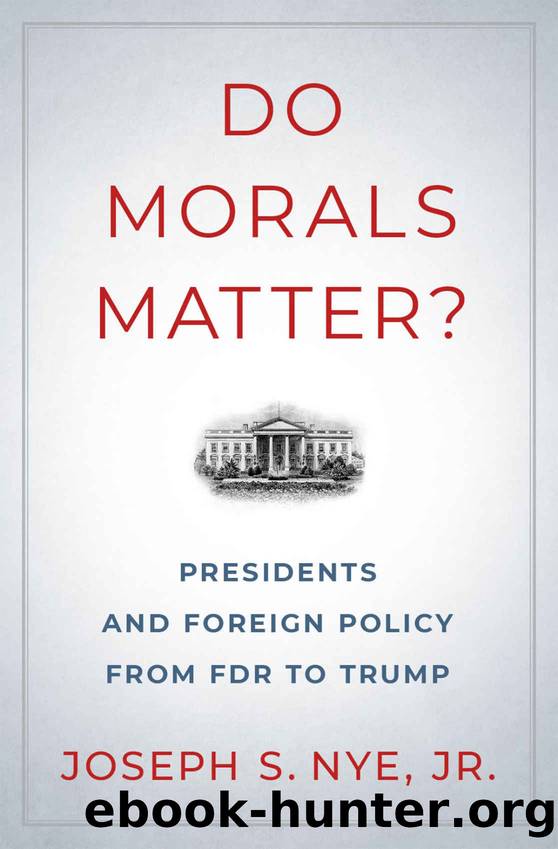Do Morals Matter? by Joseph S. Jr. Nye

Author:Joseph S. Jr. Nye [Nye, Joseph S. Jr.]
Language: eng
Format: azw3
Publisher: Oxford University Press
Published: 2019-12-01T16:00:00+00:00
Bush 41’s Ethical Scorecard
Intentions and Motives
Moral vision: attractive values, good motives good/mixed
Prudence: balance of values and risks good
Means
Force: proportion, discrimination, necessity good
Liberal: respect for rights and institutions good
Consequences
Fiduciary: success for long-term US interests good
Cosmopolitan: minimal damage to others good
Education: truthful; broad moral discourse mixed
Ending the Cold War without significant bloodshed was a major accomplishment in American foreign policy. Since 1945, the United States had lived with a bipolar balance of power, and for four decades the ideological and nuclear threat from the Soviet Union had been the central issue in US foreign policy. At the beginning of the 1980s, the Committee on the Present Danger and other groups of foreign policy notables were warning about the growing threat from the Soviet Union. By the end of 1991, both the Soviet Union and the Cold War were over. As it turned out, the perceptions of Soviet strength were misleading.
How did an empire end without war? By a combination of luck and skill. If the tough KGB chief Yuri Andropov had not died of kidney failure and Gorbachev not come to power in 1985, the Soviet threat might have continued for another decade or so. Though it was not what he intended, Gorbachev’s efforts at perestroika (restructuring) and glasnost (opening) accelerated the Soviet decline.
Some people attribute the successful outcome to the combination of Reagan’s harsh rhetoric and Bush’s prudent negotiations, but that summary is too simple. Reagan’s early rhetoric may have frightened Soviet leaders, but it increased nuclear risk and in retrospect we learned we were lucky in avoiding a crisis. Once Gorbachev came to power it was Reagan’s personal and negotiating skills, not his rhetoric, that was crucial. And Reagan was guided by his moral vision of ending the Cold War and removing the threat of nuclear weapons. Similarly, though the Bush administration came into office concerned about Reagan’s overtures, Bush’s contextual intelligence, prudence, and understanding of the importance of not humiliating Gorbachev were crucial. Some people say that in life, it is more important to be lucky than to be skillful. Fortunately, Reagan and Bush were both.
Download
This site does not store any files on its server. We only index and link to content provided by other sites. Please contact the content providers to delete copyright contents if any and email us, we'll remove relevant links or contents immediately.
The Secret History by Donna Tartt(19092)
The Social Justice Warrior Handbook by Lisa De Pasquale(12190)
Thirteen Reasons Why by Jay Asher(8912)
This Is How You Lose Her by Junot Diaz(6888)
Weapons of Math Destruction by Cathy O'Neil(6281)
Zero to One by Peter Thiel(5802)
Beartown by Fredrik Backman(5756)
The Myth of the Strong Leader by Archie Brown(5509)
The Fire Next Time by James Baldwin(5447)
How Democracies Die by Steven Levitsky & Daniel Ziblatt(5219)
Promise Me, Dad by Joe Biden(5154)
Stone's Rules by Roger Stone(5088)
A Higher Loyalty: Truth, Lies, and Leadership by James Comey(4964)
100 Deadly Skills by Clint Emerson(4926)
Rise and Kill First by Ronen Bergman(4790)
Secrecy World by Jake Bernstein(4753)
The David Icke Guide to the Global Conspiracy (and how to end it) by David Icke(4720)
The Farm by Tom Rob Smith(4514)
The Doomsday Machine by Daniel Ellsberg(4490)
